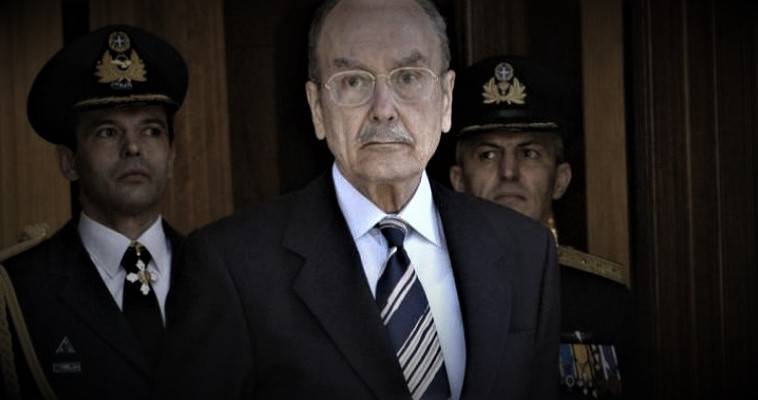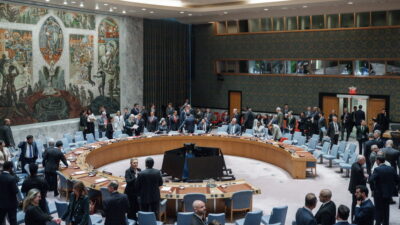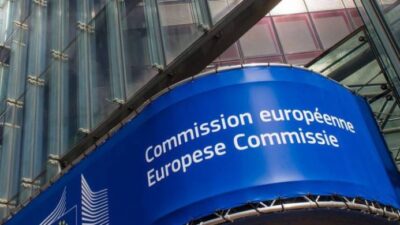Ioannis Baltzois: How I experienced the crisis in Imia from the Presidential Palace
02/02/2021
In the last few days, we “relived” the dramatic moments of the Crisis in Imia through anniversary publications. For the first time, I would like to reveal at this time events that I experienced, facts that I learned from people who were present at unknown events 25 years ago. Imia left a wound in the soul of the Greeks, in their national pride and brought forth the so-called “gray zones”.
Contributing to the restoration of the truth is more important than hiding it, a truth that hurts a lot, but is nationally useful for future situations, which may, which we hopefully avoid, be repeated. And it is nationally harmful to repeat the same mistakes.
The facts are more or less known to all of us. It was the crucial day of January 30, 1996, after a series of events, diplomatic confrontations, political statements and military mobilizations of the two countries involved, Greece and Turkey. Imia, the small one in the west and the large one in the east, were at the center of the confrontation between the two countries, with many warships in this area and the situation deteriorating and on the verge of war.
Decisions had been made on how to manage the crisis by the political leadership and how to deal with it by the military leadership. Without going into details we will mention that the mobilization was very extensive, the personnel leaves had already been revoked, the Army units had been deployed to the final destination areas, the Air Force was on high alert and the Navy was in its majority at sea.
And yet, although in general the management of the crisis seemed to be developing quite well in terms of military leadership, nevertheless we will reveal the critical and substantial mistakes made by Greek military leadership and basically the then Chief of the General Staff, Admiral Christos Lymperis, who led Armed forces. However, we will not refer to the huge mistakes of the country’s political leadership, as these are self-evident and have been demonstrated by many.
Adjutants in action
The facts that I will present for the first time are facts where the writer was an eyewitness. I will not mention names, but only their initials and the tasks involved in the events, except for some, due to the important duties they performed. I was serving at that time in the Military Office of the Presidency of the Republic, as an adjutant of the Army for the then President of the Hellenic Republic, Kostis Stefanopoulos.
Serving with me as adjutant of the Navy, the later Commander of the Navy, Admiral G.K. and as an Air Force lieutenant the later Commander of the Tactical Aviation I.P. During the noon hours, the Director of the Military Office of the Presidency of the Republic, the late Admiral Periandros Lampiris, called us to his office and assigned us a mission: to go to the operational centers of our General Staffs.
Our mission would be to attend the meetings in order to inform the President of the Republic at 21.00, about the latest developments o the issue of Imia and the preparations of our Armed Forces. I, as the oldest, would also go to the National Operations Center (ETHKEPIX). So we did and went to the operations centers of our branches, where we followed the developments and were informed about everything. After I was fully informed about the mobilization of the Army, I went to the National Operations Center, where I followed the developments and noted what was interesting, to inform the President of the Republic.
I should mention here that all the colleagues, of all branches, regardless of rank, even in the highest rank, provided us (to all the adjutants of the President of the Republic) with full information, with all the data, regardless of classification. Due to the great respect that everyone had for the President of the Republic Mr. Kostis Stefanopoulos, as in addition to love and respect for his person, he was also our natural leader, as the Commander-in-Chief of the Armed Forces, based on the Greek Constitution.
Briefings with … surprises
Of course, the President of the Republic had the same feelings for the Armed Forces of the country and in every visit anywhere in Greece, he insisted on a visit to the respective formation of the region and getting informed by the commander. So all the colleagues provided us with all the information, answered all our questions and we participated as observers in every meeting that we deemed necessary. At around 18.30 I attended the main meeting at the National Operations Center, where in the presence of the Chief of the General Staff information and directions were given.
At that time, the Armed Forces were conducting the Regular Exercise Without Troops “ALEXANDER 1996” exercise on a national scale. To my great surprise, the briefing, which started at 18.30, started with the information about the exercise and no one mentioned the situation in Imia. The briefing on the exercise lasted at least 20 minutes and then the briefing on the situation in Imia began, which lasted much less about 10 minutes.
All the branches quickly reported the preparatory work that had been done and the military readiness to deal with the situation and in accordance with the orders that had been issued. In the end, the Chief of the General Staff took the floor and after agreeing with the estimates of the staff, asked a substantive question: “When do you estimate that we will reach the peak of the crisis?”. Then a lieutenant, replied: “Anyway, not tonight, Chief, but in 1-2 days”, citing some justifying thoughts.
Then the Chief of the General Staaf replied: “I agree with you. I also estimate that tonight will not be the critical day “. So the crucial briefing at the National Business Center ended and everyone was left with the impression that on the night of January 30th to 31st, something shocking would not ensue. Besides, our ships at that time were at sea, heading to the area of Imia, where they were expected to arrive a little later.
The President was on the mark
After the briefing, I stayed for a while and after 20.00 I went to the Presidency of the Republic, where we all met at the admiral’s office and there we informed our Director, the late Admiral Lampiris Periandros. Then, around 21.00, we went to the office of the President of the Republic to inform him.
One by one, the three lieutenants, in turn, fully informed the President of the Republic about the developments, the preparation, the military movements, the readiness of the Armed Forces and everything related to the situation of the Armed Forces and the crisis of Imia. Mr. Stefanopoulos, after listening carefully to the information, asked us: “When did you say that our Staffs estimate that we will reach the peak of the crisis?”.
I replied that according to the General Staff and with the consent of the Chief, the peak of the crisis is not expected tonight (30-31 January 1996), but later, in 1-2 days. Then the President of the Republic, in a restless manner, answered us: “Why do I think that tonight we will reach the peak of the crisis? Why do I think everything will be judged tonight? Is that how our Staffs assessed? ” And turning to the Director of the Military Office, he said: “Mr. Admiral, I want you to have constant contact with the Staffs and to be informed about what is happening at any time. If you learn anything disturbing, at any time of the night, do not hesitate to call me to let me know.”
This happened on the fateful night with the President of the Republic and the events that followed that justified Mr. Stefanopoulos, with the occupation of the western islet of Imia by Turkish commandos, the helicopter crash with the sacrifice of the three officers of the Navy and balances with the Greece-Turkey agreement mediated by the USA and the thanks of the Greek Prime Minister to the USA, in Parliament. From the above fact we find that the then President of the Republic Mr. Kostis Stefanopoulos more correctly assessed the situation than the General Staff and its Chief.
The Chief of the General Staff and National Intelligence left out
The second incident I will mention was told to me by a friend and classmate of mine from the Military School, who was on duty that night at the National Operations Center as a representative of the Army. Of course, that night no one slept and at the National Operations Center after midnight everyone was awake and we could say in a state of war.
While the information came about the occupation of western Imia by the Turks in Athens, two tragic developments took place. The Chief of the General Staff waited standing for a long time outside the room where the Supreme Council for Defense and Foreign Policy (KYSEA) was meeting, which instead of convening in the chambers foreseen -as it should be in a period of crisis- was in Parliament! The Chief was thus cut off from evolving critical information.
However, the Commander of the National Intelligence Agency (EYP) had the same criminal treatment, who was also waiting outside KYSEA, without ever coming in to inform. Other tragedies have happened that hurt just to mention! Finally, the Chief returned to the General Staff and a meeting was held at the National Operations Center, on how to deal with the current situation.
Chief, go it alone!
There, the Chief asked the director of the Special Forces Directorate of the General Staff, Lieutenant General D.N. About how they could occupy western Imia and drive out the Turkish commandos. Then followed the amazing dialogue:
Chief of General Staff: “General, can you recapture western Imia and throw out the Turks? ”
Special Forces Director: “Mr. Chief, of course we can and the Greek Special Forces have the ability to successfully carry out this mission. But, as you will know, the Turks did not go there for an excursion and they will not leave if we politely tell them to leave. We may need to use weapons, so we will be involved. That is why, Mr. Chief, are you willing to provide me with naval fire, if required, and I ask for it? ”
Chief: “No.”
Special Forces Director: “If air fire is required then, are you willing to provide it to me?”
Chief: “Of course not”.
Special Forces Director: “Well, then, Mr. Chief, go and get them out yourself”. The “audacity” of this response surprised the director of the Special Forces Directorate. But for those who know, there was a reason.
At the beginning of the crisis and when the operation was being planned, the Chief of the General Staff refused the involvement of the Army. that is, he refused the Commander of Supreme Commander of the Interior and Islands ( ASDEN) to assume the responsibility of guarding the complex of the islands of Imia and Kalolimnos, in the area. Instead, he assigned this mission to the Navy’s Underwater Demolitions Unit (IRS) and not to the and its Special Forces, operating sectorally, as a Navy officer and not jointly, as Commander of the Armed Forces.
Although then-Chief Admiral Lymperis is an intelligent and capable officer, his decisions had a branch (naval) character, with fatal results. He ignored the universal and timeless doctrine that the Army manages operations on land, the Air Force in the air and the Navy at sea and assigned a mission to guard, land defense and prevent land attacks on naval units, which for the intended missions may be excellently trained, but insufficient for other types of operations and missions.
And this was evident from the fact that in the planning for the occupation of Imia, although two teams of the Underwater Demolitions Units were ordered to man the two Imia, in the end only the eastern isle was manned and the western one remained unguarded. The reason; They did not have batteries for the radios, because the team that had staffed the eastern Imia had taken them as backups, so they did not go to the western Imia, the one that remained unguarded and the Turkish commandos captured! The last fact is mentioned, as it has already been written in the press and has been said on television.





